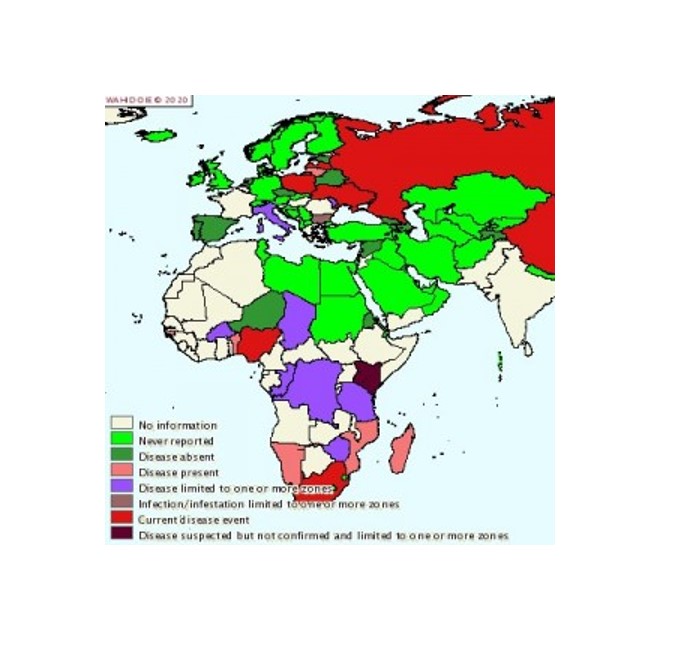
African swine fever (ASF) is a severe viral disease affecting domestic and wild pigs. In domestic pigs it is responsible for serious production and economic losses, primarily due to high mortality. This transboundary animal disease (TAD) can be spread by live or dead pigs, domestic or wild, and pork products.
Furthermore, transmission can also occur via contaminated feed and fomites (non-living objects) such as shoes, clothes, vehicles, knives, equipment etc., due to the high environmental resistance of ASF virus. There is no approved vaccine against ASF (unlike classical swine fever or ‘Hog Cholera’, which is caused by a different virus).
Historically, outbreaks have been reported in Africa and parts of Europe, South America, and the Caribbean. More recently (since 2007) the disease has been reported in multiple countries across (more countries in) Africa, Asia and Europe, in both domestic and wild pigs. The new wave of outbreaks is attributed to the lineage II strains of the virus, commonly referred to as the Georgia 1/2007 strain, which has been traced back to strains encountered in Madagascar, Mozambique and Zambia mostly (Rowlands R. J. et al. Emerg Infect Dis. 2008 Dec; 14(12): 1870–1874).
Reporting of African Swine Fever outbreaks in Africa, through immediate notifications (IN) to the OIE has increased in recent years, based on WAHIS data, covering 41 reports filed with the OIE between 2005 and May 2020:
Fig. Annual number of immediate notifications (and trend – – – – ) reported to the OIE from 2005 – 2020 (WAHIS, October 2020)
The disease is currently reported as being present in domestic pigs (WAHIS, Jan – June 2019) in some 15 African countries, tough this is likely an under-estimation, given the general underreporting of ASF and the geographical distribution of the vector, Ornithodoros spp., as well as of wildlife reservoirs (warthogs and other wild boar in Africa). In 2012, the disease was reported in 25 countries (AU-IBAR/FAO, 2017):
Map: Absence/presence of ASF in 2019 (WAHIS, 2020)
The latest countries to report outbreaks to the OIE, for the first time on their territory, or as a re-emergence of ASF, are (in alphabetical order, by November 2020) Cote d’Ivoire, Kenya, Namibia, Nigeria, Sierra Leone, South Africa, Zambia and Zimbabwe. Most of the diagnosis is currently conducted by PCR, phasing out much of the earlier test protocols (ELISA, HA,…) and in around 50% of cases, confirmation is sought from an OIE Reference Laboratory (OVI-ARC in South Africa or INIA-CISA in Spain).
Map: Absence/presence of ASF in 2012 (FAO/IBAR, 2017)
The African pig population is concentrated in sub-Saharan Africa (SSA), where it is estimated to be 35.6 million heads [FAOSTAT 2013 figures] with regional distribution of 40.3, 5.1, 35.6 and 19.7 per cent in Western, Southern, Eastern and Central Africa, respectively. The pig population is negligible in Northern Africa due to religious and cultural considerations.
During the last decade (2001 to 2011), the pig population in SSA has been growing annually at a rate of seven, six and four percent in Southern, Eastern and West African regions, respectively.
The FAOSTAT statistics for 2013 indicate that 1.3 million tons of pig meat was produced, with the main producers being Nigeria, South Africa, Mozambique and Uganda (FAO/IBAR, 2017). Updated data from FAOSTAT [2018 figures] indicate a population of 40 million (FAOSTAT, 2020).
Contrary to many (extensive and intensive) ruminant production systems, pig production can be found in dense urban to peri-urban areas. While prevention of contact between the natural wildlife hosts, vectors and domestic pigs is necessary, virus is spread among domestic pigs mainly by contact with infected pigs and pork. Preventing outbreaks in domestic pigs by improved organisation of the pig sector and identifying and mitigating the risks throughout the pig value chains is therefore key. In most SSA countries up to 90% of pigs are kept in traditional scavenging systems. Since there is no vaccine against the disease, there is a need for transformation to enable the implementation of the simple biosecurity measures necessary to protect pigs from ASF. Biosecurity should also be enhanced in the commercial sector and at all levels of the pig value chain.
PDF - 1.42MB
PDF - 833.63KB
WOAH Reference Laboratory
Dr Livio Heath
Onderstepoort Veterinary Research
Agricultural Research Council
Private Bag X05
Onderstepoort 0110
SOUTH AFRICA
Tel: +27-12 529 95.01
Email: [email protected]
FAO Reference Centre for ASF
[PENDING]
Onderstepoort Veterinary Research
Agricultural Research Council
Private Bag X05
Onderstepoort 0110
SOUTH AFRICA
Tel: +27-12 529 91 06
Tel: +27-12 529 95.01
Email: [email protected]
FAO Reference Centres for Vectors and Vector-borne diseases in Africa
Dr Sikhumbuzo Mbizeni
Onderstepoort Veterinary Research
Agricultural Research Council
Private Bag X05
Onderstepoort 0110
SOUTH AFRICA
Tel: +27-12 529 91 06
Email: [email protected] and [email protected]
Dr. Abdou Tenkouano
International Centre of Insect Physiology and Ecology (icipe)
Duduville Campus, Off Thika Road,
Kasarani
P.o.box 30772-00100, Nairobi,
KENYA
Tel: +254 20 863 2000
Tel : +254 733 634 366
Email: [email protected] and [email protected]
[PENDING]
Centre International de Recherche-Développement sur l’Elevage en zone Subhumide (CIRDES)
N°559, rue 5-31 av. du Gouverneur Louveau
Bobo-Dioulasso
BURKINA FASO
Tel: +226 20 97 20 53
Tel: +226 20 97 26 38
Email: [email protected]






